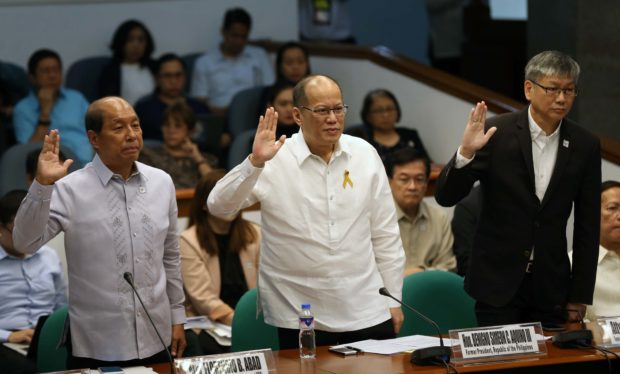Bad science blamed for Dengvaxia mess

SENATE PROBE Former President Benigno Aquino III (center), along with his budget chief,
Florencio Abad (left), and his executive secretary, Paquito Ochoa Jr., appear at the hearing of
the Senate blue ribbon committee on the government’s halted dengue immunization program
and the controversial Dengvaxia vaccine. —LYN RILLON
A Filipino scientist on Thursday blamed the Dengvaxia controversy on “bad science.”
Dr. Anthony Dans, a scientist from the National Academy of Science and Technology (NAST), also told the Senate blue ribbon committee investigating the controversy that health officials “ignored” strong signals that the Dengvaxia vaccine for dengue had harmful effects.
“The whole problem started with bad science. In our opinion that’s the root cause of the problem,” Dans told the continuation of the committee’s inquiry into the halting of the health department’s P3.5-billion immunization program that used Dengvaxia.
The department stopped the program after the maker of Dengvaxia, the French pharmaceutical company Sanofi Pasteur, announced new analysis that the vaccine could worsen symptoms in vaccinated people who had no previous exposure to the dengue virus.
‘Signals of harm’
Dans said he published a paper in the Journal of Clinical Epidemiology on his assessment of the immunization of hundreds of thousands of children aged 9 and over in May 2016 and the assessment of other experts “pointing to signals of possibility of harm” of Dengvaxia.
“There were already signals of harm [to] seronegative patients many years ago [but these were] ignored initially, [which led to] delayed recognition of that harm and the [result was] we have patients [who are] uninformed,” he said.
Seronegative patients are those whose blood tests do not show the presence of a virus, in this case, the dengue virus.
Dans said the safety issue involving Dengvaxia was not the age of the patients “but whether patients had previous dengue infection or not” and this was ignored.
“We are all victims of bad science. The World Health Organization (WHO) is a victim of that bad science. The Department of Health (DOH), the physicians who ended up prescribing it and the patients who ended up receiving it were all victims of this bad science,” he said.
Dans suggested legislation that would set how “science should be assessed” and deal with the “separation [of the] people assessing science and [the] people rendering policy.”
He agreed with Sen. Richard Gordon, the committee chair, that the Food and Drug Administration (FDA), which licensed Dengvaxia, should be independent of the DOH.
Dans said the scientists on the Formulary Executive Council, the body that approves what drugs may be sold in the Philippines, “knew and pointed out the problems” with Dengvaxia.
“But because there was no adequate separation [of] policy and science, the FDA is under the DOH, then we lose the checks and balances,” he said.
Dr. Anthony Leachon, also of the NAST, told the hearing that “you cannot mix your science, health and your politics, but it all started with bad science and perhaps deceptive or wrong information.”
No blanket recommendation
Dr. Gundo Aurel Weiler, country representative of the WHO, made it clear to the committee that the agency did not make any blanket recommendation to use Dengvaxia but set out conditions for countries to consider, including risks posed by the vaccine.
Weiler said it was up to countries to make the decision whether to use the vaccine.
Former President Benigno Aquino III attended the hearing and stood by his administration’s decision to implement the immunization program using Dengvaxia.
Aquino defended his administration against what Gordon called “unbelievable haste” in implementing the immunization program.
He said his administration decided to act immediately to have children immunized from dengue rather than wait for the new administration coming in in June 2016 without assurance that the program would be carried out.
“The choice is simple: we can implement at this point in time or wait for at least a year as a minimum and expose our people to a risk that could have been prevented because of this vaccine,” Aquino said, noting that he was responding to the “unasked” question at the hearing.
Gordon told the former President that he was not hinting at any question about his integrity but just stating facts.
In a statement he read at the start of the hearing, Aquino said that no one during his administration objected to the immunization program using Dengvaxia.
“I just want to emphasize: Before the government decided on Dengvaxia, while it was making its decision, after it made its decision and even today, no one came forward to me to object to the vaccine,” he said.
Aquino said he believed he would have been blamed if he did not act on the country’s dengue problem despite knowing that Sanofi had developed a vaccine for the disease.
Ubial, Garin clash
The six-hour hearing saw clashes among the resource persons, including between former Health Secretary Paulyn Ubial and former Health Secretary Janette Garin after Ubial claimed her opposition to Dengvaxia was the cause of her rejection by the Commission on Appointments (COA).
Ubial repeated during the hearing that she initially halted the program when she became secretary of health to review concerns that it was implemented in a large scale without preparation. She said she went ahead with it after the WHO recommendation came.
“I’m very positive that my confirmation was prejudiced by this particular issue,” Ubial said, adding there was pressure from Congress for her to extend the program.
She then disclosed that the husband of Garin, Iloilo Rep. Oscar Garin Jr., asked her during the budget hearing on Aug. 14, to buy dengue vaccine.
Ubial said Representative Garin had told her to put additional spending for the purchase of dengue vaccine in the 2018 national budget to continue the program.
Garin explained that her husband was not a member of the COA and he was just concerned that the children be able to complete the required three doses of the vaccine.